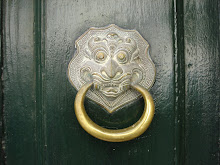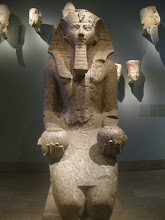On Sunday, that is to say yesterday, the Palestinian Liberation Organization (PLO) invited Israeli Knesset members and civil society activists for lunch at the Muqat'a; the President's Compound in Ramallah.
Hanan Ashrawi shaking hands with Amram Mitzna
If you follow the news, you will probably know that the peace negotiations between the Palestinian and Israeli governments are, as Nabeel Sha'ath put it, "
in a deep coma," after Netanyahu refused to stop new settlement construction in the occupied Palestinian territories in September.
Yesterday was an effort from the Palestinian political leadership to reach out to the Israeli people - to show that they are committed to keeping an open dialogue with the Israeli Jews - no matter what is going on on the political playing field.
Now, you probably didn't hear anything about the lunch meeting on the evening news last night, but it's actually a pretty big deal.
Imagine the absolutely highest level of the political elite in Palestine inviting Israeli Jews for lunch in Ramallah at a time when there is almost no contact between the two societies at all. Except between Palestinian civilians and Israeli soldiers at the checkpoints and at the borders, of course.
And then imagine that most of the Jews who came yesterday have never seen Ramallah before (even though they live maybe 15 minutes or maximum an hour away); and those who have seen Ramallah, have probably not been for eight years.
But that time - eight years ago - they weren't invited. That time, they invaded Ramallah with tanks and bombs; they demolished and besieged Al-Muqat'a and held late President Yasser Arafat prisoner for months on end.
But yesterday, they - the same people - were invited for lunch.
Arabs and their hospitality.
Yasser Abed Rabbo speaking
We sat down... oh yeah, did I forget to tell you we were invited? Tarek, his father and I.
Anyway, we sat down, and Yasser Abed Rabbo, the General Secretary of the Executive Council of the PLO and facilitator of the lunch discussion, leaned over his microphone at the table of honor and joked with the Israeli guests,
"
Ya'ni, you would think that you could have at least one woman up here..."
Then, after two Israeli women were placed at the end of the table and the press was asked to leave so that the event wouldn't turn into a press conference (it was supposed to be an informal opportunity for dialogue), he gave the floor to President Mahmoud Abbas, or
Abu Mazen.
"I told the Americans and the Israelis that if there is no freeze of settlement construction, I cannot continue the negotiations," Abu Mazen said as he was telling the story about the recent negotiations break-down. "Netanyahu said that it is impossible for him to freeze the settlements, because... because... there were many becauses."
Many becauses. I love it.
And then, "I can't accept that settlements are better than peace." Which is to say; he can't understand how the Israelis can choose settlements over peace.
Neither can I.
He said that they had been very, very close to reaching an agreement on the two most important questions - security and borders - before this latest round of talks (that is to say, two years ago at Annapolis), but that Israel had refused to continue negotiations after they launched their war on Gaza that Christmas.
One Jewish Knesset member said that he didn't know this; and that it is very important for Israelis to know that the two most important questions are borders and security, and not the Right of Return for the Palestinian refugees. It gave him hope.
Other Jewish Knesset members thanked Abu Mazen for inviting them, and for extending a hand, and talked about the importance of dialogue, and how the majority of Israelis want peace and how they support a two-state solution.
"We have come here today to listen to you," one man said.
Another Jewish man talked about his 82-year-old mother who, although she always votes for the ultra-orthodox Zionist party, Shas (that has called for the total annihilation of evil Palestinians), she still "supports peace."
(Which is a little bit like saying that a Swedish neo-Nazi still likes immigrants).
The same man also had a 28-year-old son, he let us know, who had been here eight years ago, as an Israeli soldier besieging Al-Muqat'a. But he (again, like a Swedish immigrant-friendly neo-Nazi) is a real peace activist.
"Because you can't be a real peace activist unless you are a good soldier who protects the security of your country."
(I'm still trying to work that one out).
Then Hanan Ashrawi, a member of the Executive Committee of the PLO, was given the floor. And she said:
"I don't want to rain on your parade..." and of course started raining a rather cold - but very refreshing - rain that brought everybody back to reality a little.
"If you say that the majority of Israelis want peace," she said, "then how come you don't elect a peace government?"
(I.e. not extreme right parties like Likud and Shas).
She spoke about the Wall and about the settlements that are "spreading like an octopus," leaving nothing but a few isolated population centers for Palestine.
"The two-state solution is all but dead." It continued raining. "We don't have five minutes of negotiations left; we have only one minute. We are running out of time."
One Israeli man pointed out that leaders must not be pessimists.
A Palestinian woman stood up, perhaps a little empowered by Hanan Ashrawi, and drew attention to what an Israeli person who had spoken earlier had said:
"You said you have come here to listen. Yet it is not we who need to talk, it's you. We already said everything we can say. Now it's Israel's turn to answer us."
A young Jewish woman who had probably prepared her intervention beforehand, and was therefore sort of very out of context, started talking about the need for Palestinians to recognize Israel's right to exist as a Jewish state.
Saeb Erekat, the Chief negotiator of the PLO, pointed out that the PLO already recognized Israel's right to exist years ago.
"But when you ask me to recognize the state of Israel as a Jewish state," he explained, "you're asking me to join the Zionist movement."
Which he was not prepared to do for obvious reasons, not in the least that it would be very problematic to proclaim a state Jewish when more than 20% of its citizens are not even Jews.
We listened to Palestinians and Jews speaking their mind. Many Jews supported the PLO and criticized their own government.
Waiters brought us bread and hummus, arugula salad, stuffed grape leaves, avocado salad, fresh orange juice, Palestinian olives, rice and meat, and knafeh, a very sweet Arabic pastry with nuts and cheese that literally drips with sugary syrup.
And before we knew it, the lunch meeting was coming to an end.
(So is my energy, unfortunately, which is why I think I will wait with the second part of the title of this blog post until tomorrow:
How I Got to Hold Hands with the President of Palestine).
Yasser Abed Rabbo took the microphone again:
"Thank you for all the kind words you have said about the Palestinian government. And thank you for the... semi-kind words about the Israeli. I think what Abu Mazen wanted to say today," (because sometimes Yasser knows better), "is that the two most important questions before us are borders and security. If these are solved, then all other questions will be solved... within an hour."





































